Text

october bullet journal spread!
2 notes
·
View notes
Photo

Impostor Syndrome: What it is and how to deal with it
There may be times when you feel like a fraud, like at any moment people will find out that you have no clue what you’re doing and you don’t deserve any of your achievements. You think that you’re unworthy of praise, that you only succeeded out of luck.
This is known as Impostor Syndrome, and around 70% of people have struggled with it in their lives. The problem arises when high achievers fail to internalize their success, i.e. when you attribute your success not to your own abilities but rather to external factors.
Some say that impostor syndrome could be linked to traits like anxiety or neuroticism. Impostor syndrome has also been commonly attributed to behavioral causes like childhood experiences, e.g. being labeled as “the smart one” or “the talented one”.
Another huge factor is how well you think you fit into a certain group, e.g. impostor syndrome is common among people of a racial/ethnic/cultural minority, women in STEM, and international students at US universities.
Dr. Pauline R. Clance was the first to design a scale to measure impostor syndrome based on six factors
The impostor cycle, where someone is given an achievement-related task and they either (a) overprepare or (b) procrastinate
The need to be special/the best
Superhuman characteristics
Fear of failure
Denial of ability and discounting praise
Feeling fear and guilt about success
There are different types of impostors, as categorized by Dr. Valerie Young, an expert on impostor syndrome (note that these categories aren’t mutually exclusive):
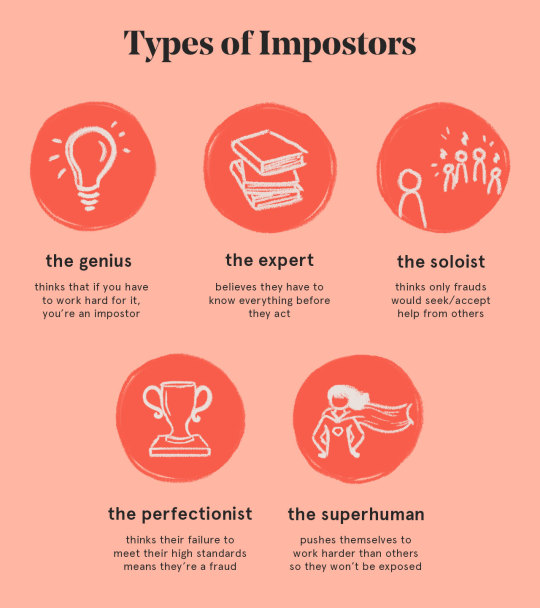
I’ve personally dealt with the first two types. I’m fairly certain I can attribute being ‘the genius’ to childhood/adolescent circumstance: I’ve been known as ‘the smart one’ throughout elementary school and high school - every time I made a mistake, it was met with a chorus of ‘wahh jo made a mistake…’ Even last month when I had a mini-reunion with some of my high school friends, one of them said something along the lines of “I like when Jo makes mistakes because it reminds me that she’s human, too.” I can definitely say I’ve overcome that now because, you know, college - everyone’s as smart or smarter than you and works pretty hard.
Being ‘the expert’ is still something I’m still trying to overcome. Last spring when I was applying to internships, I only dared to apply to those where I met 100% of the requirements. I’ve been coding for like 4 years but I constantly think I’m incompetent. It once got up to the point where I literally took 3 similar courses to assure myself that I actually do know how to do full-stack web programming. I still struggle to draw the line between relearning something because I don’t think I really know it, versus learning something for the expansion of knowledge.
How do I deal with it?
Firstly acknowledge that you have impostor-related thoughts Awareness is the first step to changing how you think and how you act.
How does impostor syndrome look like in a school/college setting? Examples include
You refrain from asking questions because you think other students/TAs/the professor will think you’re dumb;
You don’t respond to questions even though you kind of know the answer but you always think your answers aren’t right enough or that they’re simply wrong;
You don’t participate in discussions because you feel that you won’t add any value; or
You prevent yourself from having an opinion because you feel like you have no right to have one.
Reframe your thoughts
Think of their possible effects Do these thoughts help or hinder me? Will anything useful come out of thinking this? Acknowledge that not speaking up may mean slowing your team down or depriving your classmates of potentially valuable insights.
Separate fact from feeling Are they factual or simply a misinterpretation of my environment?
Differentiate feelings of fraudulence from feeling like an outsider Does my work show that I’m incompetent or is the fact that I’m the only female in a team of males/POC in a team of Caucasians make me think I’m inferior?
Stop comparing yourself to other people You might think something along the lines of “there are already so many people who can do what I do but so much better, so what’s the point in even trying?” However, remember that these people were once where you were, and taking even the smallest of actions could help you get to where they are.
Be more forgiving with yourself
Rethink perfection Not everything has to be perfect. Even if you have high standards, not achieving those standards doesn’t make you any less worthy.
Reframe mistakes and identify areas of improvement It’s okay to be wrong or not to know everything. Think of mistakes as learning opportunities and indicators of gaps in your knowledge/understanding of something, as opposed to a negative measure of your self-worth. Being wrong doesn’t mean you’re fake; it just means you have more to learn.
For example, previously I would only answer a question in class if I was at least 90% sure that was the correct answer. That’s a high threshold, and I don’t think it’s very useful for helping me learn and grow. Over the course of a year, I’ve managed to lower that down to I’d say around 60% (50% with coffee lmao).
Collect positive experience
Remember and reflect on praises Think about the efforts you exerted to help you achieve something and the positive responses you garnered when you finally achieved it. Remind yourself of the words of encouragement other people have told you, no matter how small. You could even keep a folder/document/journal to look back on when you feel like a fraud.
Heck, sometimes I feel like my posts aren’t useful or my designs are terrible, but then you guys tell me such kind things and I think, maybe I’m not as bad as I thought.
However, while it’s good to remember the good words people have said, don’t work just for the sake of praise. Focus on the value of the work itself and not the validation that comes from it.
Focus on providing value
Focus on what you can say Instead of thinking about what you don’t know, focus on what you do know and what you can say. Even if what you say isn’t entirely correct or relevant, it’ll get others around you thinking.
Remind yourself that holding back is like robbing the world of your ideas There’s always some value in your words, even if you don’t initially think so. How that value affects the world or other people may differ. For example, when you put forward an idea/thought in a discussion, it could be that
If there were parts that were incorrect, other people might have had the same misconception and are more than happy for the clarification;
Again, if there were parts that weren’t correct, they might not have had the same misconception but now realize that there is a way in which the subject can be misinterpreted, thus allowing them to have a more comprehensive understanding of the subject; and/or
It’ll stimulate further thinking and discussion and raise more questions, especially if other people wouldn’t normally think what you just thought. Then other people could bounce off your idea and form an equally great one.
Take action You won’t feel as much of a fraud if you’re doing something that brings you a little closer to achieving your goals or that adds value to your work.
However, be careful not to overwork yourself. Every time you start doing something, pause and think: is this really important to my progress or am I just trying to prove myself?
Instead of working on too many things, do something outside your comfort zone each day no matter how small. Once you do this, focus on quality (your growth) instead of quantity (the number of things you do).
Also, for those of you who fall into the ‘expert’ category, this also means practicing just-in-time learning, i.e. learning things when you need it, not just to comfort yourself.

I hope that was helpful, and please don’t hesitate to reach out if you have any questions/comments/suggestions :)
9K notes
·
View notes
Photo
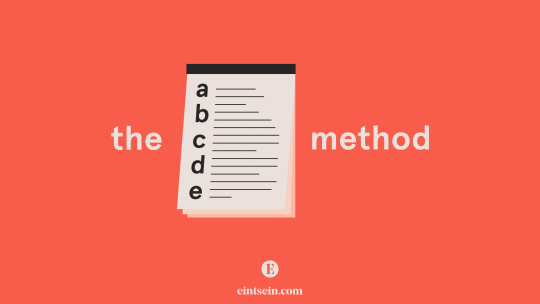


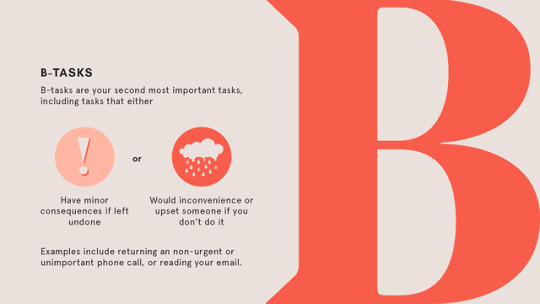

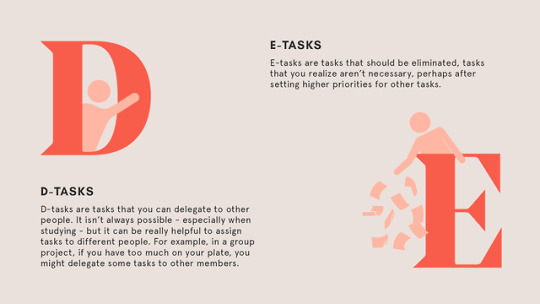

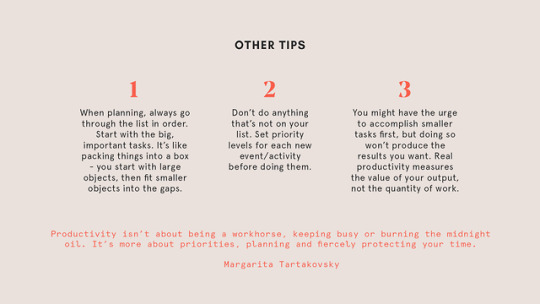

The ABCDE Method: Accomplish Tasks more Efficiently
I recently came across the ABCDE method that’s similar to what I do to stay productive each day: instead of lumping up all your tasks, sort them into categories and tackle each of them differently. Here’s an outline of the method. Hope it helps :)
16K notes
·
View notes
Text

Organisation and Planning
Have a planner or some area where you can write your plans for the day so you can easily see when you have a class or event.
Update your planner/ calendar every day
Have weekly to do lists. I taped mine in each week of my planner so i can see all tasks and events in the one glance.
Clean your desk or work space every night or after a session, this way it’s so much easier to get started the next day.
Have a post it note near you to jot down important things you remember for you to do later that way you don’t get sidetracked.
Get out any power cords, pens, food etc. that you need for a study sesh before you start.
Stick on your wall a list of upcoming assignments or class work due dates and tick of as you do them, or post it note them and remove when done.
Break down tasks on lists so it seems more achievable.
Always make a plan before starting an assignment, maybe a mind map of what needs to be done and where you’ll get what info. I love doing this for essays.
Make sure you know what things you need to do before each class whether its reading or printing slides, come prepared.
Keep all notes for a subject together whether in a folder or digitally, this will help in exam season and don’t leave papers in your bag to be forgotten about.
Empty your bag everyday and put handouts or information in its appropriate place.
Studying
Pomodoro! Most people i know do the 30 mins study 5 min break but this has always been too short of time for me to accomplish something with too little of a break so i tend to do 45 or 60 minutes with a 10 minute break which is pretty much the same time it just works better for me.
ASMR! i know this sounds cringe or cliche but asmr can be super relaxing and provides that white noise that we like without listening to music which may prove distracting. I suggest the Harry potter common room ones they are beautiful.
Attitude. This is so important because if you go into studying pessimistically you will end up annoyed, go in with the mindset of getting a lot done and reaching your goals.
A pretty work space is a used work space, well at least for me. When my walls are covered with artwork and my desk is neat i feel most motivated, cleaning your desk is a small task that might inspire you to get working.
Candles, see above.
Watch YouTube videos on the subject you’re studying, for visual and auditory learners this is especially helpful.
Make summaries after your notes, mainly focusing on explicit points in the syllabus.
Make sure your summaries are done as you complete the course work so you are prepared for exam season.
A few weeks before exams make a list of all you want to get done before then and start working!
If you have your textbook on your device get a program that will read the text to you, save your eyes and this is normally a quicker way to digest material.
Find the study space that works for you, e.g. home, the library etc.
As much as i love it, coffee makes you peak and come down so if you can water and good snacks can be better for sustained energy.
DO PRACTICE QUESTIONS! For some reason i thought it was okay to think about a practice question and then just look at the answer? No, this did not work, you need to actually see what you know and write a response.
When possible work under exam conditions, it’s going to be stressful to be put under those circumstances but you need to actually get used to working that way.
Set a time and write down all you know about a small topic on a page, what you miss is what you need to go over.
Most textbooks are a base resource that can help you if you don’t understand a concept but there shouldn’t be too many notes to gather that you shouldn’t have already gotten in class, this is obviously different for each class but for me this has been the case. Don’t waste good revision time relearning what you know.
Highlighting allows us to tune out of the actual reading so avoid when possible and take notes as you go if you need to as this makes you focus more.
Flashcards are fun to make and they are proven to work, just make sure if you make question cards you don’t cheat when using them and look at the answers.
Making your notes is pretty but time consuming, don’t feel pressured to have that aesthetic all the time, the work is more important.
Find online quizzes on the topics you are studying. Many people have done your course before and already put in the hard yards, take advantage of this.
As above there are many resources for topics online, find these before you start a new section to be extra prepared.
Rereading notes before bed makes sure it stays in your head as your brain will be processing it overnight or some science but it does work.
When studying put your phone in another room to relieve the urge to check it all the time.
Stationery
Have a good trusty pen. Mine is the uniball signo. We have a friendship, it’s good.
I’ve learned recently you don’t need 100 coloured pens and the entire fine-liner collection because i only like a few colours and often don’t have enough time to use a brush pen, markers, highlighters and pens all in the one page of notes.
Don’t feel pressured to have pretty equipment, functional equipment is 100 times more important
Small dot or grid notebooks to do summaries in or mind maps really has helped me feel motivated because they do look really pretty and gets me focused in exam times.
There is a movement towards digitising notes but i think it is still good to have a binder for handouts and articles etc.
Only take to college/school/university the essentials and save your back.
Keep a few bad ballpoints in your bag to save giving friends your nice pens and never getting them back.
Don’t buy stationery that doesn’t work, yes the New York post its i got were beautiful, did they stick at all, no. This clutters your work space and steals your money.
Personal Care
Don’t feel guilty for taking breaks, realistically know your limits and think of it as refuelling.
Try to eat healthy not for weight or looking good but because your body will hate you when you are always giving it takeaway and then asking it to do 14 hour study sessions.
When struggling to focus of a morning, get up and have a shower. This will wake you up and get you feeling motivated.
Have a support person. Mine is my boyfriend and is the person i can just let out all the stress onto, have a cry and then get back to work. You just need to let it out sometimes.
A more relaxed study method is to group up with friends and test each other, create little games etc.
Make sure you still socialise and go to events during crazy stressful periods because you need an outlet and a break.
write out your goals for a term, semester, class or year and refer back to them when you get your results, this will make sure you are judging yourself by your own standards and not compared to anyone else’s.
Reach out for help or advice, whether that’s to friends or people on tumblr or your professors, if you are struggling its ok to get a hand.
5K notes
·
View notes
Note
yooo how do u email a prof for a recommendation letter?
Hi Professor!
I am in the process of applying to ____ and they require letters of rec. I sincerely enjoyed your classes, and felt that they gave me a particularly good chance to display my strengths, such as ____ [class participation, writing, etc.] and would love for you to write me a letter, if you’d be willing. The due date is ____, and I can send you further instructions for submission later if you accept.
Attached to this email is ____, the piece of work I did in your class which best showcases my abilities, as well as my current CV [or resume]. If you agree to write me a letter, soon I will also send you drafts of my ____ [statement of purpose, personal statement, application essays, other relevant material] for my application to aid in your writing. I am also happy to meet in person to discuss this with you.
I want to stress that this application is quite competitive, so if you feel you will not be able to write me a strong letter then I completely understand - but please let me know. Thank you so much for your time!
Sincerely, ____
—
a few notes:
- you should have all your relevant materials (app essays, etc.) sent to them *at least* a month in advance to give them ample time to write the letter
- thus, your initial email asking them if they’d be willing to write a letter for you should be sent *over* a month in advance. professors are busy
- if you are applying for a really prestigious position/scholarship/fellowship, or grad school, it’s best to have at least a majority of your letter writers be professors (rather than adjuncts or post docs). ideally you’d want them to be full/tenured professors. in lots of cases, especially academic ones, *who* writes your letter matters - not just *what’s in* your letter
- the reason you send them the piece of work you did in their class that you are most proud of is to remind them of your abilities as a student and the quality of the work you produced for them. they have lots of students. sometimes they need a bit of help jogging their memory of exactly what you did in their class.
- the reason you send them your other application materials (personal statement, statement of purpose, CV) is so that they have information to draw from when writing your letter. they know what you’re passionate about, what you hope to do in the future, other experience you have, and can use this information when writing your letter
- on a similar note, this is also why you’d want to list the strengths you displayed in their class
- basically, you want to give them as much information as you can about your strengths, goals, and intentions - give them prompts they can use to write your letter
- the bit at the end about asking for a “strong letter” is important because some professors can only write you mediocre letters (e.g. “this student was always on time to class and gave their undivided attention during lecture” - what does this tell admission committees? well, it tells them that the professor has nothing positive to say about your *academic* abilities and so they’re resorting to other strengths. it’s a polite way of saying “this student was okay, but not spectacular in any notable way”. big red flag for admissions committees.) if all you’re going to get is a mediocre letter, you might as well not get a letter at all
- if the professor you ask accepts, then be sure to send them polite reminders as the date approaches. (i usually send a reminder at the 1-month-till-due-date mark when i send the other application materials, and then again at the 2 week and 1 week marks, and, if necessary, every day after the final 3 days leading up to the due date
—
i know this was a lot, but i remember being in your shoes and being completely lost when it came to applying for stuff so i know how daunting it can be. i figured i’d just throw all this information at you to be of as much help as possible.
for reference, i’ve applied to graduate programs, fellowships, and scholarships. i have been accepted into several of the top 10 graduate programs in my area, as well as received multiple scholarships and a fellowship, and received honorable mentions for some of the most competitive fellowships in the US. i have also worked with the admissions committee at my graduate program to organize multiple informational events for those interested in applying to graduate school and, in the process, have learned a lot about what makes a strong application.
so while you should absolutely take my advice with a grain of salt (different circumstances call for different standards), i do have quite a bit of experience with applications and what makes a strong letter of rec.
i hope this helped! best of luck with whatever you’re applying for :)
9K notes
·
View notes
Text
I graduated from high school. Here’s what I learned.
I started this blog at the end of my freshman year. I had a 4.0 GPA and I thought that high school was going to be a breeze for me. hahhahahahh that’s so funny to me.
High school is hard. It kind of beat me up. A bunch. I spent so many nights alone in my room working on homework (mostly math lol) not able to figure anything out. I had classes and teachers that I H A T E D (again, mostly math). I was really sad and lonely for most of it.
I would see all these movies about high school and feel like I was doing it all wrong. I never went out and partied. I didn’t have a best friend who I could talk to at all hours of the night. I wasn’t ridiculously smart like I thought that I should be since I was so lonely all the time (this is such flawed logic by the way, loneliness does not mean you have to be smart I was just kind of sad). I constantly felt like I was wasting my whole high school career. I now realize that it doesn’t really matter that much. I still have plenty of time to have fun in college.
But high school wasn’t all bad either! I had some seriously great teachers and classes that I LOVED! I really learned so much! It gave me opportunities to try new things and take on leadership roles in clubs and athletics that really helped me to grow as person. My time in high school provided me with opportunities that helped me to make an informed decision about what I want to do with my future. Ironically, even though I hated high school so much, I want to be a high school teacher.
Even with all the good, I can confidently say that I am very excited to get out of high school. I can’t wait to leave the constant competition there. I can’t wait to leave the small mindedness that comes with the suburbs.
Honestly for me, despite the relative success that I had in high school, the most best part about high school is that it ends. It seems like it goes on forever. But four years really isn’t that much time. It’ll suck for what feels like forever and then you get to leave. Nice.
0 notes
Photo
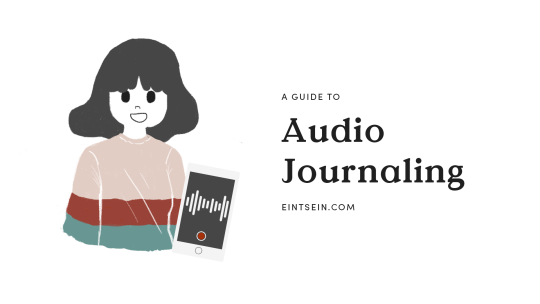
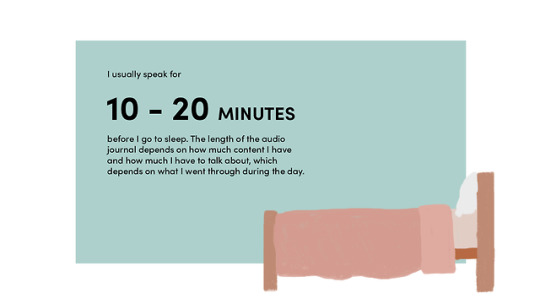
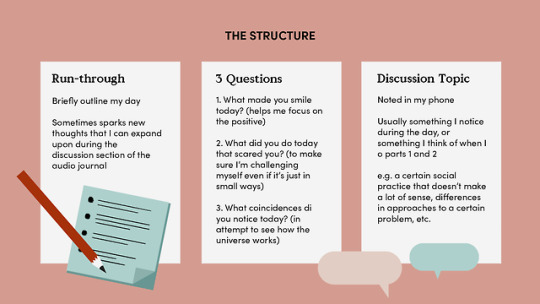
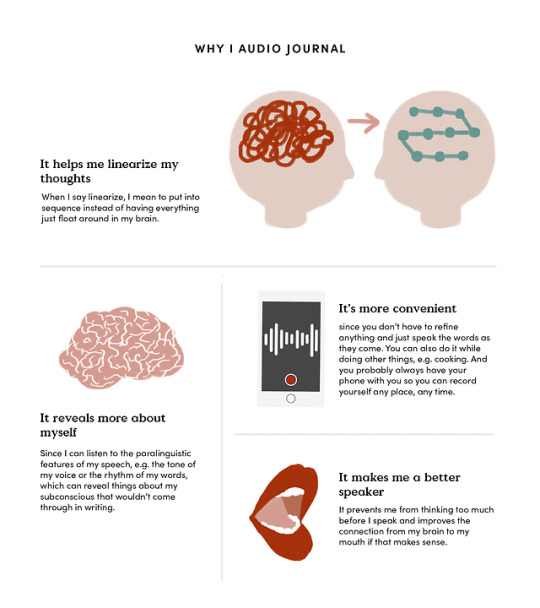
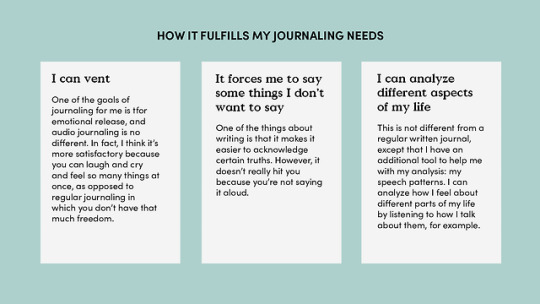
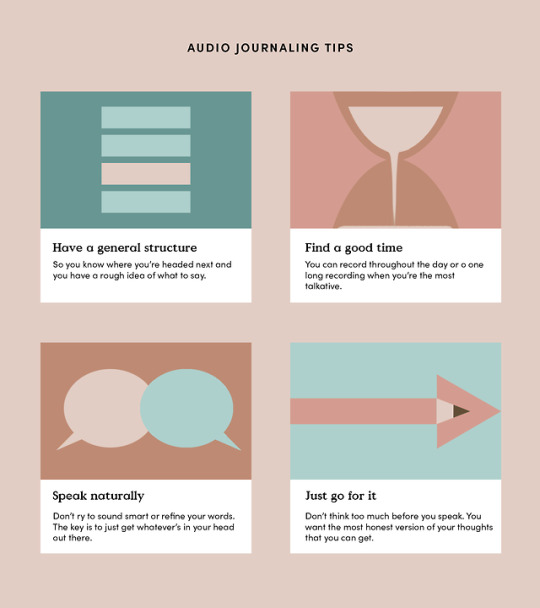

A Guide to Audio Journaling
This past month (or longer, I think) I switched from regular, written journaling to audio journaling, and I thought it’d be great to share my experience: the practice, what I actually do, why I do it, and some things to think about if you wanna try it out.
I keep all my audio journals on the voice memos app on my phone, but if any of you know an alternate platform to do so, feel free to share!
Anyway, hope this helps, and as usual, if you have any questions, don’t hesitate to send me a message or drop me an ask. Have an awesome week :)
10K notes
·
View notes
Text
you know, life doesn’t have to be competitive. you don’t have to get in the very best university; you don’t have to get the highest paying career there is. you don’t need to compare and compete with everyone else in the world. you need to do what’s right for you. you need to relax, take a breath, and say ‘what do i want, for myself, to live as i want to’. and, if that involves high ambitions, then that’s fine. because you chose those ambitions on what you desire as an individual, and not on what is expected in order to succeed. let’s be ourselves this year.
79K notes
·
View notes
Text
Extended Essay Tips! (from an IB student with senioritis)
I finished my EE last week. Here are some tips that I wish I would’ve had while I was writing mine!
1. Pick a topic you’re genuinely interested in!!!
This is IMPORTANT because you’ll be doing a lot of research and writing about this topic. If you hate what you’re writing about, it will be that much harder to motivate yourself to actually get stuff done.
2. KEEP TRACK OF YOUR SOURCES
It might be annoying in the short term, but it will be so helpful in the long term when you don’t have to sort through 30 different journals and books to find one specific fact to cite.
3. Make a quality outline!
Outlining should really be the hardest part if you’re doing it right. It is so much easier to move things around and work on structure with an outline than a completed paper. Also, a thorough outline will make compiling the rest of the paper so much easier.
4. Try to start earlier rather than later
This is an obvious one, but really. Senioritis is real. SO REAL. By march of senior year you pretty much know where you’re going next (at least in the states) and doing high school stuff is really difficult motivation-wise. Start your EE early so you can have it done by the time all of your motivation to succeed leaves you.
5. 4,000 words is way less than you think it is
It sounds like a lot, but it really only leaves space for either deep explanation of one VERY specific topic, or a surface-scratch explanation of a huge topic. This is IB, so they want deep. Pick a specific topic.
6. Online libraries and databases are your friend
Google scholar?? GOOD SHIT FOR THIS PAPER. I have no idea how anybody wrote the extended essay before the internet.
7. Chunk it.
Don’t try to write this paper all at once. Break it up into small tasks and work through it that way. Not only will it make the whole process seem more manageable, but your writing will sound less frantic and your ideas will be more coherent.
8. Enjoy it!!!
We have such a cool opportunity to explore a topic that interests us and write about it! Take advantage of this! Enjoy learning about a topic that’s is fascinating for you! Take pride in your writing! Acknowledge this opportunity that so few high schoolers get to have and appreciate it. The EE can be overwhelming and stressful and scary, but at the end of the day it’s so cool and has been a super positive experience for me :)
1 note
·
View note
Photo

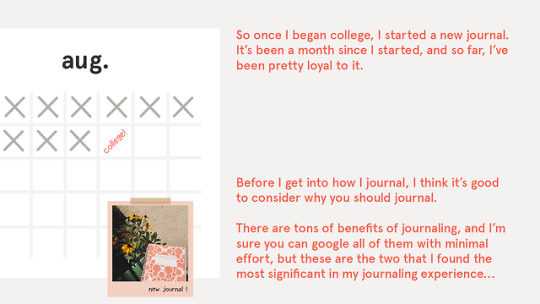

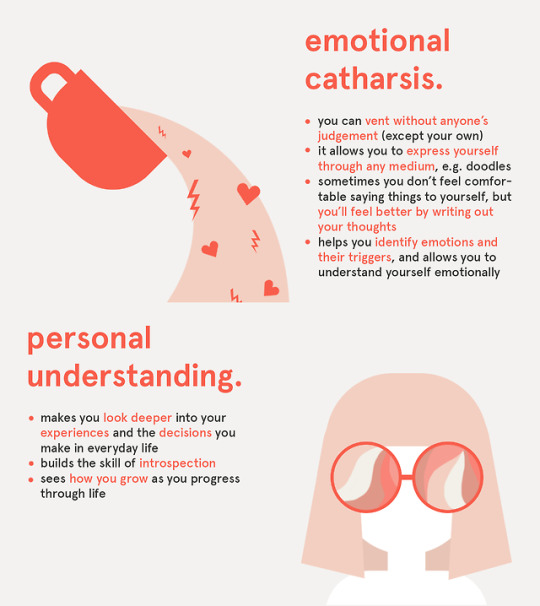


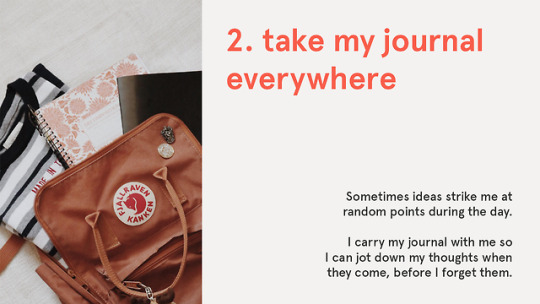

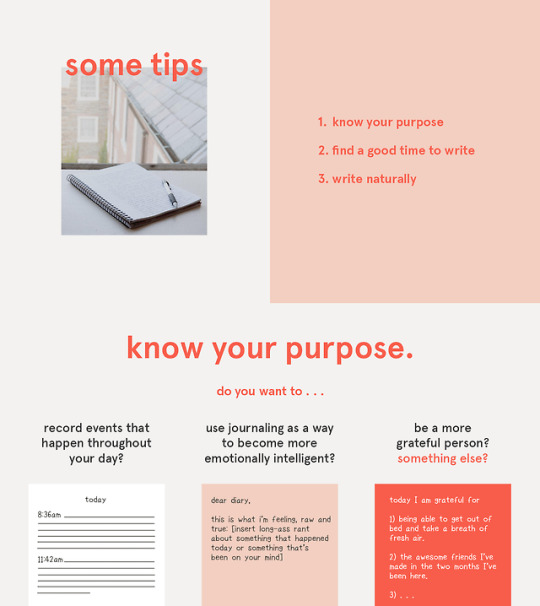
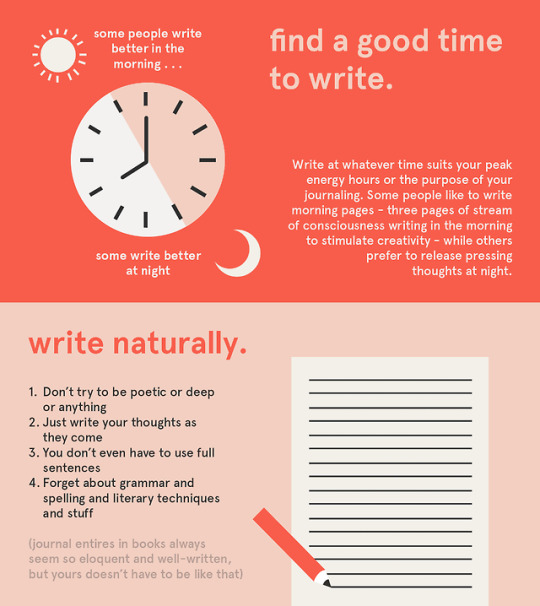
A Small Guide to Journaling by Eintsein
Something you may or may not know about be is that I journal. However, only recently have I gotten the hang of it and stayed loyal to the habit of journaling. Here are some tips and tricks on how you can journal successfully. Hope you like it :)
30K notes
·
View notes
Photo

Okay, so you’ve been called smart all your life. As a kid, you were one of the smartest in your class. Maybe you could read at a much higher level than your peers, or you could fly through multiplication drills like they were nothing. Then, you get to high school and suddenly you’re surrounded by lots of people who were ‘gifted kids’. None of what made you ‘special’ seems all that important now. Your work is actually challenging, and it’s actually requiring effort.
If you’re experiencing this, just know that so many students have gone through the same thing. Maybe it happens in high school, maybe college. But a lot of us who were considered gifted as kids suddenly run into this and it challenges our entire identity. It can be paralyzing, but it’s 100% possible to overcome it and succeed! I’ve compiled a few tips for ex-gifted kids dealing with impostor syndrome and self-doubt. I’m not a therapist, psychologist, or any sort of education expert. I’m just speaking to my own experiences, and I welcome any input from others who have insight into this as well!
1. Understand that working hard does not mean you aren’t intelligent. If something doesn’t come naturally to you, that’s not a reason to give up. Believing that people can do things “just because they were born with a talent for it” is only going to hurt you. It’s not true! People may have natural aptitudes for things, but hard work is involved even for the smartest or most talented people. You are capable of learning anything, and you don’t have to be “good at it” right away to do so.
2. Comparison will kill you. You are your only competition. Focusing on how you rank with other students, and comparing yourself to your classmates is going to exhaust you. By focusing on others, you can’t put your full energy into focusing on your work and yourself. You belong. Even if you struggle with your work, you belong. Focus on your own self-improvement and doing your best.
3. Don’t focus on the goal, focus on your current actions. If you’re always thinking about the future, and about whether you’ll get into that school or that program or win that award or get that scholarship, you’re not using that time to get work done. Don’t worry about college applications, just do your homework. Focus on what you are doing now to reach your goals so you can apply to schools with confidence later.
4. Your grades may not reflect intelligence, but they do reflect work ethic. Don’t let others convince you that grades mean nothing. They sure as hell mean a lot to colleges, and thinking that you should “reject the current education system” is not going to harm anyone but yourself. If you don’t feel like you’re learning anything in your high school classes, that’s all the more reason to want to get into a university that will challenge you. If you put effort into your work, it will not let you down. Your hard work will be reflected on your transcript. Don’t lose focus.
5. Talk to someone. Let people know if you’re struggling. It can be hard to feel like you aren’t allowed to identify as “smart” or to feel pressure to constantly compete and improve. I went to a highly competitive high school that pushed kids to cope in dangerous ways. This is not healthy and not okay. If you’re feeling overwhelmed you need to find healthy coping mechanisms. Speak with someone you trust and don’t let yourself spiral. Don’t try to self medicate. Your well being is always more important than your grades. Period.
6. Enjoy yourself. School may seem like hell, and you may feel like it will never end and you’ll always be stressed and worried. But high school is only four years, and you can do things during that time that you probably won’t ever again. Take advantage of things that seem fun, even if people think they’re nerdy or weird. Try and remind yourself that you’re lucky to have your education and you have the power to do great things with it. Don’t lose sight of your own ability and your bright future!
15K notes
·
View notes
Text
Common mistakes when studying for exams:
1. Not starting early enough While many students intend to begin studying for final exams a couple of weeks beforehand, that timeline often slips as exams approach. After several days of convincing yourself, it will be OK to skip this one day and get started tomorrow, suddenly what was supposed to be a week of studying turns into one or two frantic nights of cramming. Studying for exams often takes more time than you might anticipate, so make sure you get started early!
2. Studying in chronological rather than priority order One common approach to studying for exams is to sit down and look through all of the notes from class in chronological order. In addition to being a very passive study strategy (more on this below), it also puts you at risk of running out of time to review the material you learned most recently, which is often emphasized more heavily on the final exam. Instead of studying in chronological order, try studying in priority order, spending the majority of your time on the information that will be most important for you to know for the test.
3. Practicing in the wrong format (not how you’ll be tested) I often find that students will study the same way for all of their exams, regardless of the format. For example, they might study for history by making flashcards for all the key terms in their notes. This might be a great strategy for a test that is mostly multiple choice and matching questions…but it could get you into trouble if your test is the mostly short answer and essay questions that require you to answer “why” and “how” questions about the bigger-picture concepts from the class. If you want to be prepared for your exams, you need to make sure that the way you are studying for your test is similar to the way you will actually be tested on the material.
4. Reviewing information you already know Even when students are testing themselves and using active study strategies, they often spend the majority of their time on topics they already know. Doing problems you are familiar with and know how to solve is more comfortable, and gives you a nice boost in your self-confidence. The problem with this approach is that you often end up running out of time to work through the challenging problems that you don’t know how to solve…and those are the ones that you end up missing on the test. Don’t waste your time studying things you already know! Once you’ve confirmed that you understand and can answer questions about a certain concept, check it off your list and move on to something more challenging.
5. Memorizing, rather than understanding I frequently see students who have been studying by trying to memorize all of the facts from a class, rather than truly understanding the underlying concepts. Memorizing can work well in some classes, especially in elementary and middle school, but it often backfires in more advanced classes. If you’ve memorized a definition but don’t really understand what it means, then as soon as the information is presented in a slightly different format, or you’re asked to apply it to a new type of problem, you will have no idea how to proceed. Rather than memorizing the information from your classes, use study strategies that encourage you to understand it. Explaining ideas out loud in your own words, or teaching them to someone else, are great examples of study strategies that promote understanding.
6. Calculating Your Final Grade A lot of students try to figure out what effect different final exam grades will have on their final grade in the course. (For example: “I have to get at least a 90 on the final to get an A in the class.”) Indeed, almost every e-mail I get asking for exam preparation tips seems to be prefaced with some range of scores the student has to hit in order to get some desired final grade.
Don’t do this! No good can possibly come from such a superficial focus on the numbers. It will add stress. This, in turn, will make it harder for you to execute a reasonable, specific, and efficient study plan. Also, it’s just plain crass. You don’t want to be that person…Forget about your G.P.A., and focus, instead, on how you can best prepare for the specific challenge in front of you. If you screw up, you screw up.
Source
16K notes
·
View notes
Text
I got deferred from a college!
And I’m OKAY!!!!
It was really hard for me at first, but trusting the process and knowing that I will ultimately end up at the right school helps a ton. That’s so much easier said than done, but at the end of the day it is so beyond control that getting upset is, while completely appropriate and okay, not worth the time or energy.
I also have a twin sister who was accepted into that same college, and that has been tougher for me than the deferral itself. College admissions are hard enough to navigate emotionally, and the difficulties magnify by a million with a twin. There is so much inherent comparison (people always ask who the smart, pretty, other adjectives one is) with twins and it is SO easy to get caught up in the madness of it all. I definitely felt it a lot. For about a week after the decisions were released, I could barely get out of bed because I felt so stupid and inferior to my sister. I was ashamed and upset, and I felt concretely worse than my sister in every single way. This took a lot longer to get over than the disappointment of knowing that I might not be able to go to one of my top choice schools. I just had to keep focusing on all of the places that I had been accepted to and all of the opportunities I would have there and just forget about how my sister would be getting those same things at a school that I really wanted to attend. Eventually I started to be able to feel excited for her and stop feeling so awful about my perceived shortcomings. It was hard, but I did it.
At the end of the day, college admissions are kind of bullshit. None of it makes any sense and there is nothing any of us can do about it. It sucks, but a deferral or rejection is not the end of the world. They happen to so many people and are nothing to be ashamed of. Also, college admissions do NOT reflect your worth as a person, as much as it may feel like they do right now. It’s a hard time, but we will make it through.
5 notes
·
View notes
Text
save some money because we are all broke students
Are you too completely broke after spending all your money on Urban Outfitters, your Spotify subscription, that new MacBook for the (overpriced) Studyblr Aesthetic ™?

I recently graduated high school, and now, as a student, I can finally get my account at UNiDAYS. It’s a platform with discounts on basically everything - from the Financial Times to a cute little French Lifestyle Subscription Box I found recently. (Apparently the one for September is focused on weekly planning and stationery!!) It’s helped me to save money immensely - for example with the 50% student Spotify discount. I’ve also planned to get a new tablet soon - both Apple and Microsoft offer discounts as well. All you need to do is register here with your university email. If you’re not in university yet - or already done - please share so other studyblrs can benefit from it!
4K notes
·
View notes
Text
Questions to Ask When You Arrive at University
Where is the nearest place to do laundry?
What is the cheapest way to get laundry done?
Where is the nearest place to get a big grocery shop done?
Where is the nearest place to buy snacks/essentials?
What is the quickest way to/from lectures?
What is the quickest way to/from the library?
Where is the nearest doctor?
How do I register with a local doctor?
What are my compulsory obligations?
What societies can I join and where can I find out more?
Where are the nearest (and cheapest) clubs and bars?
Where is the nearest kitchen to my room?
What appliances am I allowed in my room?
What are the rules for decorating my room?
What exercise can I fit into my study routine?
How can I contact the mental health representatives in the university?
How much stuff can I store in my room/elsewhere in the university over the holidays?
What free events are going on?
Do I have enough time to sleep, do my work, and do extra stuff?
Where is the nearest shopping centre?
What kind of student discounts am I eligible for and where?
What kind of software/printing do I have access for through my institution?
What are the opening and closing times of the libraries that I need?
Who can I rely on in my course to take notes for me if I’m not there?
Where can I buy cheap stationery?
Where are the best local food places?
What kind of excursions/talks/experiences can I negotiate my way into?
Who is teaching me?
How do I contact the people teaching me?
What are the requirements to get certain grades in a class?
How do I contact the students’ union?
Where is the nearest social space (like a common room)?
What does my reading list look like?
If I am studying abroad (or not to be honest), what kind of identification/general documentation do I need to bring with me?
Do I have somewhere I can safely lock away valuables?
Do I have somewhere where I won’t lose my keys?
Where are the nearest showers?
How do I contact my university’s careers service?
What kind of things are available for free during freshers’ week?
What do I need to arrange regarding transport?
What is one thing I should try for the very first time?
2K notes
·
View notes
Text
How to Deal with Study Burnout

As students in this day and age, it’s quite common for us to juggle rigorous academic responsibilities and overwhelming extracurricular activities. As a result, we might feel burnt out. But what exactly is burnout?
Burnout is when you feel physically and mentally exhausted as a result of constantly lacking the energy required to fulfill the demands of your studying.
Burnout can be broken down into three parts:
Exhaustion is what causes you to feel tired all the time and unable to concentrate. You could also get sick or have trouble sleeping.
Cynicism or depersonalization is when you feel disconnected from those around you, e.g. your friends and family.
Inefficacy is a decrease in productivity, efficiency, or quality of your work.
How do you know if you have burnout?
Symptoms may vary, but they include:
Being unable to absorb new information
Intellectual exhaustion
Decreasing academic performance and productivity
Feeling like you need to prove yourself
Making yourself work even more, even though you’re exhausted or being unwilling to study further
Neglecting your needs
Long term fatigue
Showing disinterest in things you normally enjoy, e.g. hobbies or friends
Denying that something’s wrong with you (may manifest in the form of aggression)
Avoiding social interaction
Feeling empty and depressed
What can I do to fix it?
Here are some short term solutions for dealing with burnout.

1. Take a power nap Power naps are life changing. They help you recharge your energy and get you ready to start working again. They also improve learning, memory, creativity, alertness, and mood. I would recommend napping for 30 minutes at most, because anything more will lead to a longer sleep session.
Optional: drink coffee before your nap - something that takes a short while to consume like a shot of espresso - so that you’ll feel alert and revitalized afterwards!
2. Take a shower A cold one will wake you up, but a warm one will calm you down. I suggest starting with warm water, then ending with cold water.
3. Exercise Whether it’s playing soccer or doing yoga, the important thing is to get moving! Exercise releases endorphins or happy hormones that help you combat stress.
4. Run a quick errand This will help take your mind off things while also getting something done! You’ll also end up walking, which is technically a form of exercise.
5. Call or visit a friend Sometimes what we’re lacking is social interaction, and hanging out with a friend definitely helps. Whether it’s providing you with a distraction or giving emotional support, your friends are always there to help you. Plus, science has shown that being with friends reduces your cortisol (stress hormone) levels.
6. Eat a snack Preferably a healthy one. Eat something with proteins, vitamins, and fibers to boost your mood. Here’s a list of mood boosting foods.
7. Surf the web This requires A TON of discipline, but it’s definitely a game changer. Surfing the web is one of the most relaxing things you could do. I personally look for a good laugh during my study breaks, so I’d watch a comedy or scroll through memes to get those happy hormones up and running.
8. Do an activity you find interesting, e.g. a hobby We all need happiness in our lives, and our hobbies are perhaps the best way to find that joy. You could sit down with a page turning adventure, or go outside and shoot hoops, or listen to a podcast, or even bullet journal, as long as you’re having a good time.
9. Listen to music Music is one of the ways we gain energy, so I always make time for it during the day. However, you should choose the right music, because not all the music you love is going to make you feel energized. For me, it’s pop punk with hard hitting beats, thundering guitars, and really upbeat, enthusiastic vocals. Some of you might be energized by mellow music with dreamy vocals that make you feel like you’re floating in the clouds. If you choose the wrong music, you might just end up feeling sluggish and drained.
10. Get some fresh air Your brain needs 20% of the oxygen in your body. Fresh air brings more oxygen to your brain so that you can think more clearly, feel less tired, and concentrate more easily.
How do I make sure I don’t get it in the future?
Avoiding study burnout in the long term has a lot to do with our study habits - as well as our daily habits. We need to make sure that our bodies and minds receive the things they need, and that we aren’t overworking them.
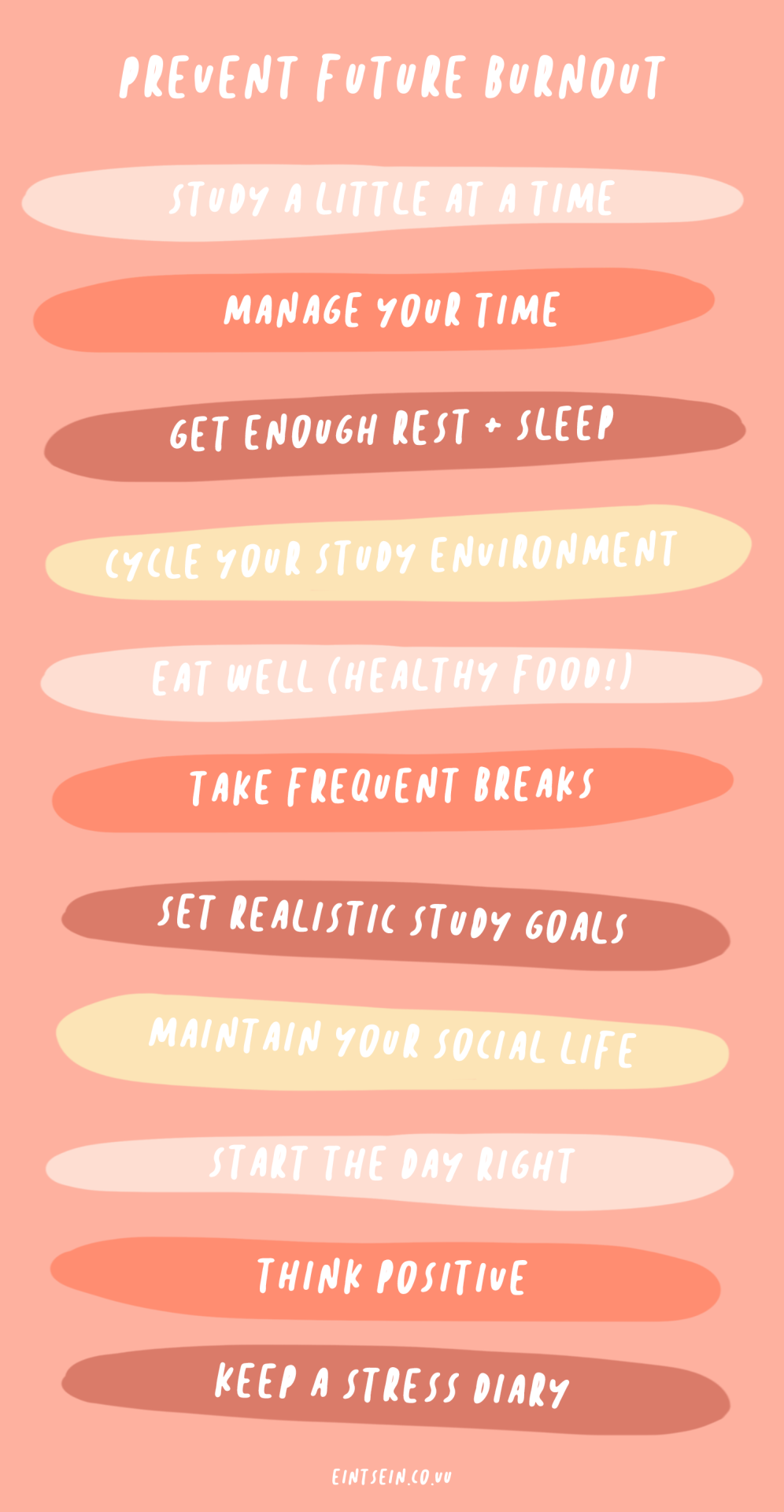
1. Study a little at a time Break up your notes into smaller, more easily digestible pieces and learn a little at a time. This way, you’re not overwhelming your brain, and you have time to let that new knowledge settle in.
2. Time management Having a good study schedule is crucial in preventing burnout. You don’t want to force yourself to work at your slow hours. Aside from that, you definitely shouldn’t leave things until the last minute, and sticking to a schdule will help you pace yourself. Here’s a post I wrote on How to Make an Efficient Revision Schedule and How to Beat Procrastination.
3. Get enough rest I cannot stress enough that sleep is so important for you. It improves your cognitive functioning and also enhances your mood, making it less likely that you’ll get burnt out. Make sure to take power naps, too, if you feel like you need them.
You also really shouldn’t pull all-nighters. Sleep is also involved in cementing memories in your brain, so if you study a little before you sleep, you’re bound to remember more than if you studied a chapter during an all nighter.
Having trouble sleeping? Here’s a post I made about my night routine and how to get better sleep.
4. Cycle your study environments Your body and mind are bound to get tired from being in the same location for prolonged periods of time. The best way to fix that is to study in different places: at your desk, your backyard, the dining table, a cafe, a friend’s house, the library, etc.You should find a frequency that works for you. I like to switch it up every 2-3 days; some people change locations every week.
5. Eat well As I’ve mentioned before, healthy foods with protein, vitamins, and fiber greatly improve your mood and your physical health. Proper nutrition will give your brain the power it needs to push through. Also make sure not to skip meals; honestly you’ll just end up feeling terrible afterwards.
6. Take frequent breaks Let’s face it, we’re human, we’re bound to get tired from studying for a long time. Taking breaks enables our brains to digest the information we just learned in a pace that works for it. Breaks also help us focus on something other than studying, so that when we do get back to it, we’ll be ready to digest even more information.
7. Set realistic study goals You’re gonna memorize all 500 pages of your biology textbook in one day? Good luck with that. Some of you might be compulsive studiers, but this kind of habit isn’t very good for your brain or your physical health. Studies have shown that excess studying can lead to lower productivity, fatigue, and - you guessed it - burnout. In the end, this will result in lower academic performance, perhaps even in the long run. So instead of trying to study so much in one sitting or one day, break up your material into chunks.
8. Maintain your social life Wherever you lie on the introvert-extrovert spectrum, everyone needs social interaction once in a while. It keeps you sane and healthy. Go out with your friends, have a sleepover, or maybe even a study date.
9. Start the day right What we do in the morning can significantly affect our mood for the rest of the day. Sometimes we don’t even feel like getting up in the morning, or doing anything that day. One thing you should do is create a morning routine you enjoy to jumpstart your day. Here are 8 Morning Habits for Productivity.
10. Think positive When we’re feeling burnt out, it’s hard to not think negatively about everything. In reality, that just makes our condition worse. So think positively! Start small, like congratulating yourself for getting out of bed today, and then work your way up to bigger accomplishments, like finishing 2 chapters of your textbook.
11. Keep a stress diary This is kind of a new concept for me, but it’s really great. How it works is that each day, you would write down all the things that made you stressed and how they made you stressed. This will help you identify the things you’re doing that’s causing your burnout, e.g.
Too long study hours? take regular breaks
Too much time in the same place? cycle your study environment
Not eating properly? set aside time to eat healthy meals at least 2 times a day
Not doing the things you love? schedule in time for that, e.g. during your long breaks
Not getting enough human interaction? make a study group
Too much negative thinking? adopt a positive mindset (you can always start small)
Not getting enough sleep? fix your sleep schedule
And that’s all I have for you guys this time. Hope these tips will help you manage your stress and study burnout whenever you have them. And if you have any questions, don’t hesitate to drop an ask!
P.S. if any of you want to see the images in this post in better quality, click here (link to google drive)
29K notes
·
View notes
